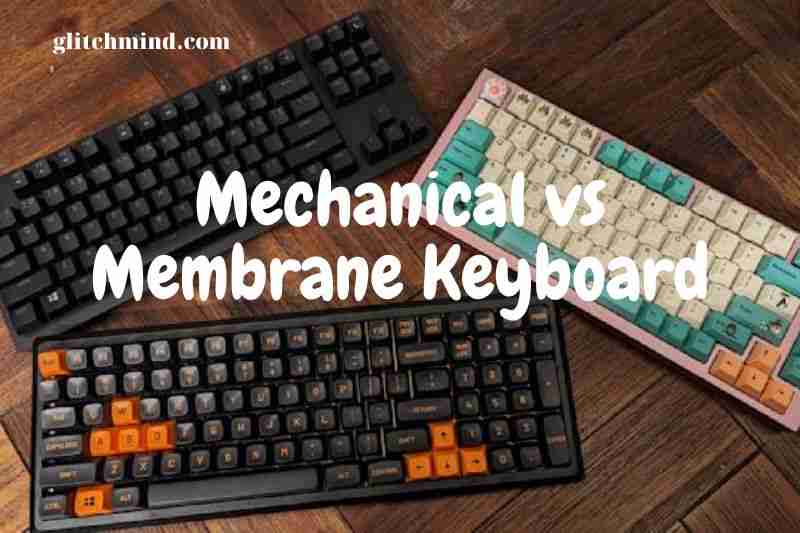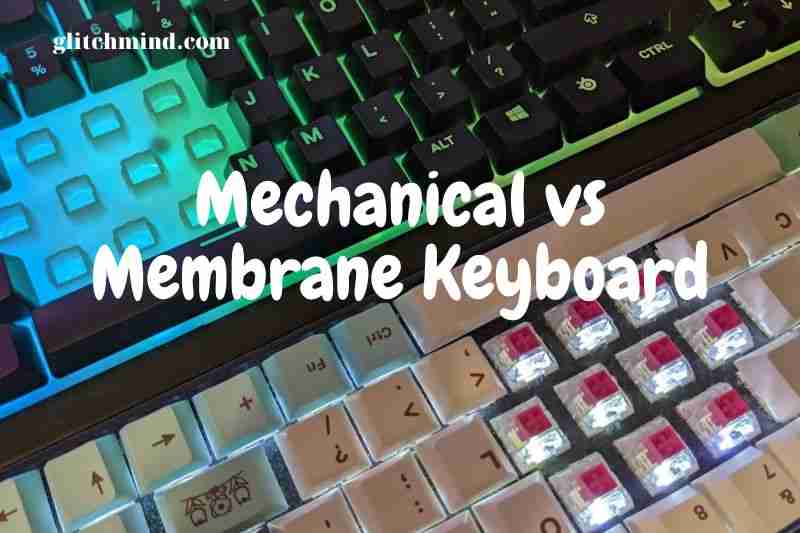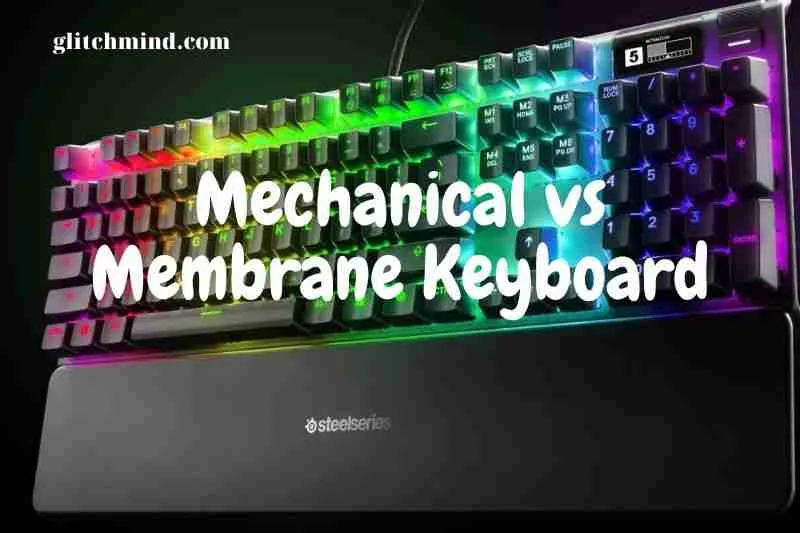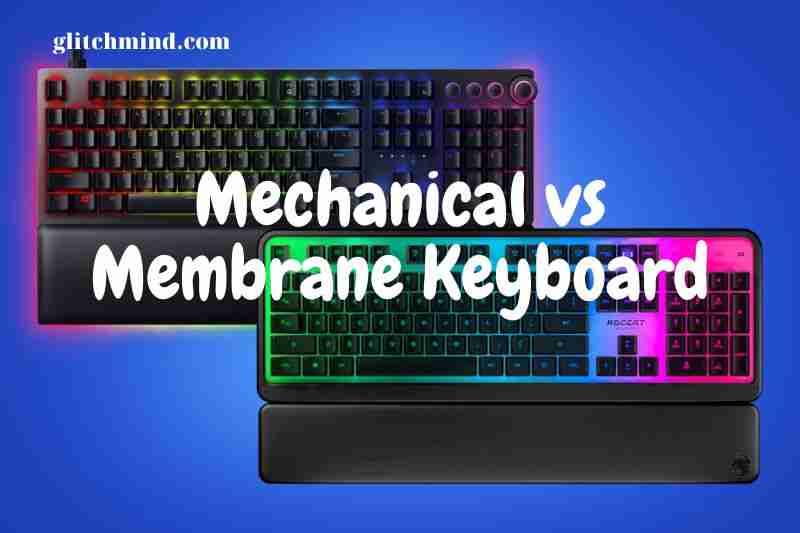When it comes to choosing a keyboard, there are two main types: Mechanical vs Membrane Keyboard. Mechanical keyboards offer superior responsiveness and tactile feedback. They also tend to be more durable and last longer than membrane keyboards.
On the other hand, membrane keyboards are usually less expensive and quieter. In addition, they require less force to actuate each keystroke, making them better suited for typing tasks. Ultimately, it depends on your personal preference and specific needs as to which type of keyboard is best for you.
If gaming is your main focus, then a mechanical keyboard is probably the right choice, whereas if you’re looking for an everyday typing instrument, then a membrane keyboard could be the better option.
What is a membrane keyboard?
A membrane keyboard comprises three layers: the top membrane, keyholes the bottom membrane. When users press the key, it is passed through these layers until it reaches an electrically conductive circuit, where the keystroke gets recorded.
They’re inexpensive rubber-layered keyboards that provide less feedback than an expensive mechanical keyboard with springs with audible precision.
Pros of a membrane keyboard
Many users tend to ignore membrane keyboards. Instead of mechanical keyboards, these aren’t focusing on slick features such as RGB lighting and media controls. But that does not mean that membrane keyboards cannot come with these fantastic features.
They are made for users who are on a budget but want to cover their needs for typing with an ergonomic option. The keys of the membrane keyboard are more affordable since there are fewer manufacturing costs to design one, which lowers the total price of the keyboard.
Additionally, membrane keyboards are flexible since they are typically composed of plastic components, making them lighter and easier to carry around. However, mechanical keyboards could be challenging in various circumstances, even after incorporating superior-quality materials and components.
Additionally, membrane keyboards don’t produce the same noise as their mechanical counterparts since they don’t feature spring-loaded switches. The membrane keyboards come with several rubber layers that reduce the audible feedback from the press of a key. This is why it makes them more suitable for workplace setups.
Cons of Membrane Keyboards
Typing is a feeling: When you press the key, the keys demand more effort. Some users have found that keyboards made of membranes tend to be “mushy” to type on and can affect the typing experience.
Key Rollover: If you’re an efficient type, there will be instances when you’re typing. Keys won’t be recognized as hits because the key must be pressed down thoroughly. It often occurs to me.
Life span: Despite having an average life span of millions of keystrokes and lasting for years, the membrane keyboard may still be worn out faster than a traditional keyboard. When they wear out, the membrane begins to feel softer, which results in the keys losing feedback.
Cleaning: While it is possible to remove keycaps from mechanical keyboards so that you can clean your keyboard, it’s much more challenging to clean membrane keyboards since keycaps are not easily removed.

How Membrane Keyboards Work
Membrane keyboards are extremely simple in their layout. They can be viewed as a system made up of multiple layers. The base one comprises a circuit board with connectors that trigger every key. The top layer is a membrane that’s an elastic material similar to rubber, with the key’s contact points raised by default.
We then have the actual keys on the top of the membrane. When a key is hit, it squishes the membrane downwards, pushing the contact point onto the circuit board before closing the circuit corresponding to that key. This lets the keyboard register the keystroke.
It’s cheap to make and reproduce. It’s been the norm for keyboards on desktops for an extended period.
What is a mechanical keyboard?
Different switches control each key in mechanical keyboards. In contrast to membrane keyboards, the keys on mechanical keyboards need less pressure to make the press. The mechanical keyboard switch replaces the rubber layer with a mechanism underneath each key.
If the key presses this mechanism, the press is recorded and sent to the CPU to generate the desired result. They are more precise than membrane keyboards because each key has its switch.
Based on the keyboard’s actuation, the key must not be fully pressed to detect the keystroke. This characteristic of mechanical keyboards is helpful for gamers and types who require a more significant response.
Pros of a mechanical keyboard
Mechanical keyboards come with three fundamental kinds of switches: linear, tactile, and clicky. Each switch is equipped with different features. However, users have to pick them based on their personal preferences.
For example, linear switches give no feedback once it reaches the actuation point. Tactile switches give tactile feedback, while clicky switches emit the sound of a click.
Gamers and eSports opponents use the clicky and tactile buttons on keyboards made of machines since they don’t have to be fully pressed down. The users can achieve more action per minute using these switches.
Mechanical keyboards also come with a variety of essential features in comparison to membrane keyboards. These include anti-ghosting, n-key rollover macro keys, and anti-ghosting.
Many users consider these features vital. In addition, the mechanical keyboard is typically the most suitable option if you want rapid response time, durability, and many connectivity choices are essential to you.
Cons of mechanical keyboards
The more expensive keyboards use the most expensive materials and techniques, and you’ll need to spend more money than you would usually for a membrane to buy one.
Loud: The mechanical keyboard produced depends on the switches employed, like blues, as they can be loud. If you’re crowded with people there, they’ll be able to hear your typing even if you’ve got the door shut or are using a microphone. Some don’t like the sound and like their work.
Heavy: While this can be a pro for certain people, it could be a negative for people who shift their keyboards about while traveling or moving between different desktops.
DIY skills are required. Although mechanical keyboards are employed straight from the package, they can be enjoyable to personalize using different keys and switches. However, modifying it could require some DIY abilities.

How Mechanical Keyboards Work?
The mechanical keyboard can be more complex than. Each key is equipped with its switch beneath the keycap. It is an electronic device activated when it is at the threshold.
Key switches are identified by various characteristics, including the amount of travel required to make a keypress register, the sound they make when pressed, and the resistance to keystrokes they offer.
Mechanical keyboards are adaptable when it comes to design. Some require only very gentle tapping to activate their keys. Other keyboards are known to make a loud click sound while typing. This is a preferred feature by many users. However, the most significant difference is its reliability.
Mechanical keyboards are generally more reliable on every key press. Read more about that below.
Mechanical vs membrane keyboard
1. Actuation Force
The actuation force is different for the two, but they’re also a manufacturer-dependent variable for membrane keyboards because they use unique membranes, unlike the similar mass-produced switches used in mechanical keyboards and are switch dependent for mechanical keyboards.
There are two possible membrane keyboards. However, they’d need different quantities of pressure. However, the force of actuation for membrane keyboards is between 60 to 80 grams. Mechanical keyboards’ actuation force is between 45 and 85; however, it could be as higher as 300 grams.
2. Actuation Distance
The actuation distance is the distance a keyboard travels before making contact with electricity. It’s an excellent measure of the keyboard’s responsiveness.
Mechanical keyboards are actuated at shorter distances, considerably shorter than membrane keyboards. They’re also quicker and more responsive compared to membranes. Mechanical keyboards are the best if you’re a professional writer and a severe gaming enthusiast.

3. Tactility
In the context of keyboard concern, it refers to the feedback we experience when we type. The majority of mechanical keyboards provide more tactile feedback than membrane keyboards.
Due to their lack of mechanical switches, membrane keyboards feel a bit fuzzy and more sturdy than mechanical keyboards.
4. Durability
Mechanical keyboards are durable bastards!
As opposed to the mere 10 million life span of keyboards with membranes, They can last up to fifty million strokes.
A few low-quality keyboards will last up to 2 million keystrokes.
5. Noise
Membrane keyboards are most silent than the others. This is because mechanical keys produce an audible click when the key is actuated and a “clack” sound when the key is lowered.
6. Cost
The keyboards made of the membrane are less expensive. It’s not surprising since they have a shorter time and are punished differently than mechanical keyboards.
7. Types Of Switches
Membrane keyboards make use of membrane switches. The moment the end (poles) from two membranes come into contact, the keyboard circuit closes, and a key press is recorded.
Mechanical keyboards make use of mechanical switches and are offered in different varieties.
There are linear switches like that of the Cherry MX Blue Stems that don’t provide any feedback or sound when they hit the actuation point and clicky switches that generate a sound when hitting the actuation point, and tactile switches, such as the Blue Stems of the Cherry MX that provide tactile feedback upon hitting the point of actuation.
Which should you choose?
Ultimately, the decision between mechanical and membrane is based on your needs for your keyboard. If you spend a lot of time on your keyboard or require a device that can be used for gaming, then choose a mechanical keyboard.
The feedback from mechanical keyboards is fantastic, and when you’re able to handle the sound (and the cost increase), You’ll enjoy an easier typing or gaming experience because of the ability to support full keys that roll over.
Our preferred mechanical keyboard would be the SteelSeries Apex Pro, a great design that gives you excellent gaming and typing experience, a fantastic wrist rest, and RGB lighting.
Read also:

